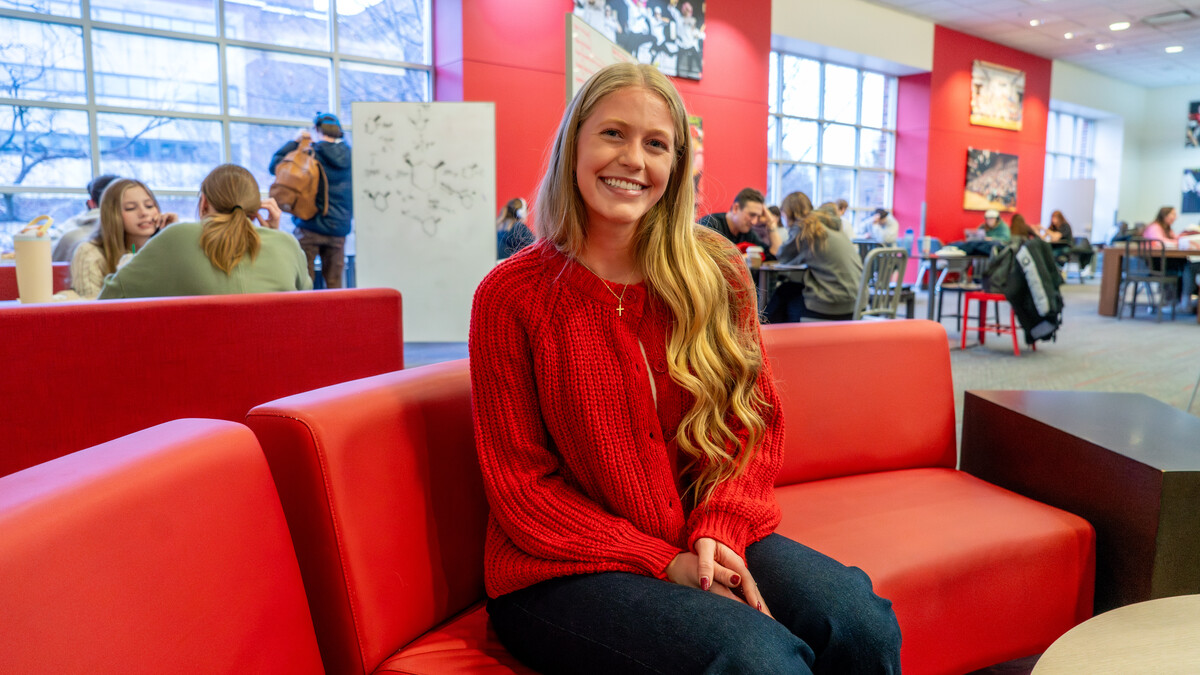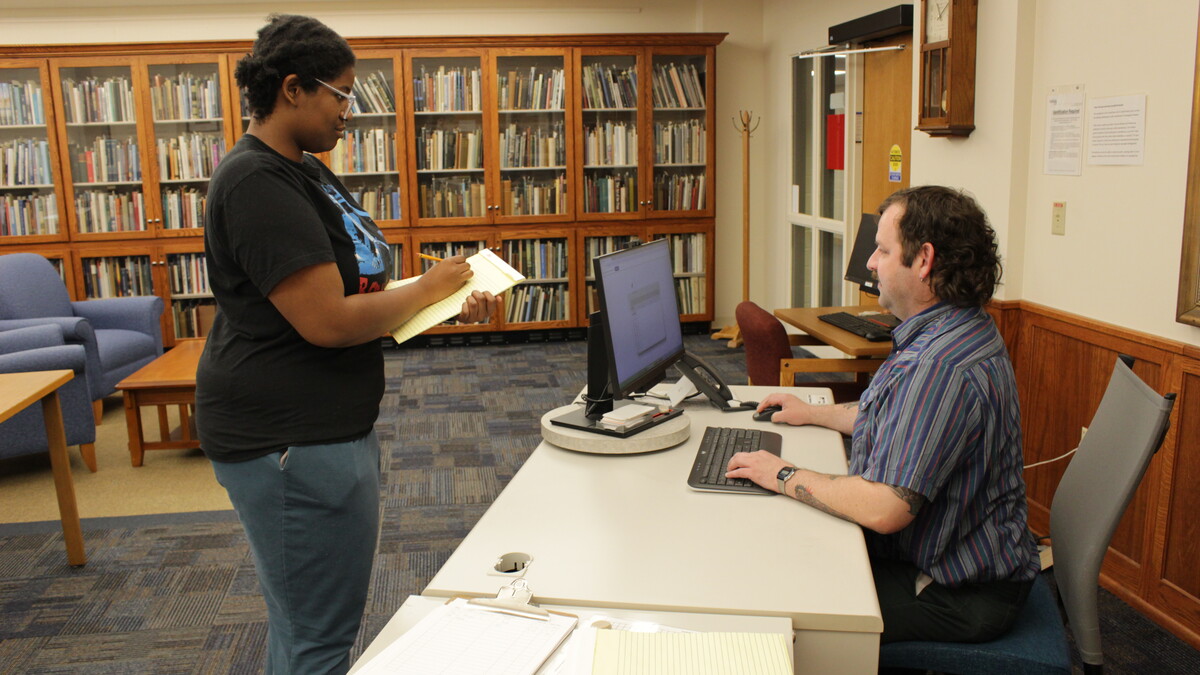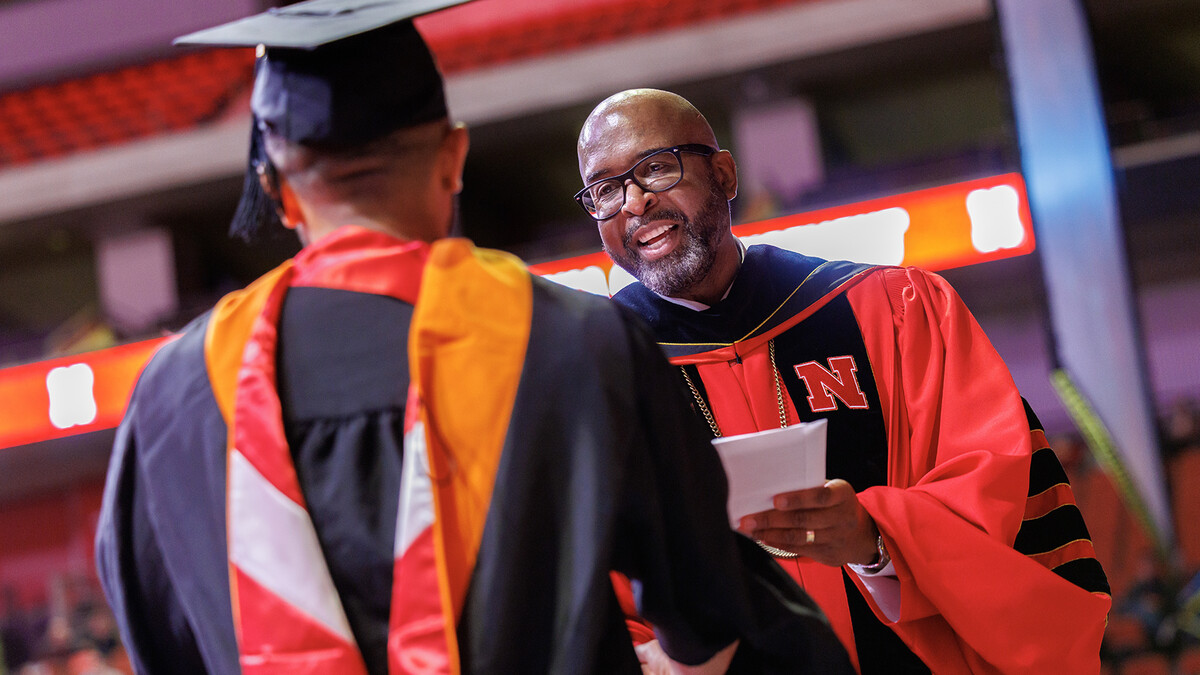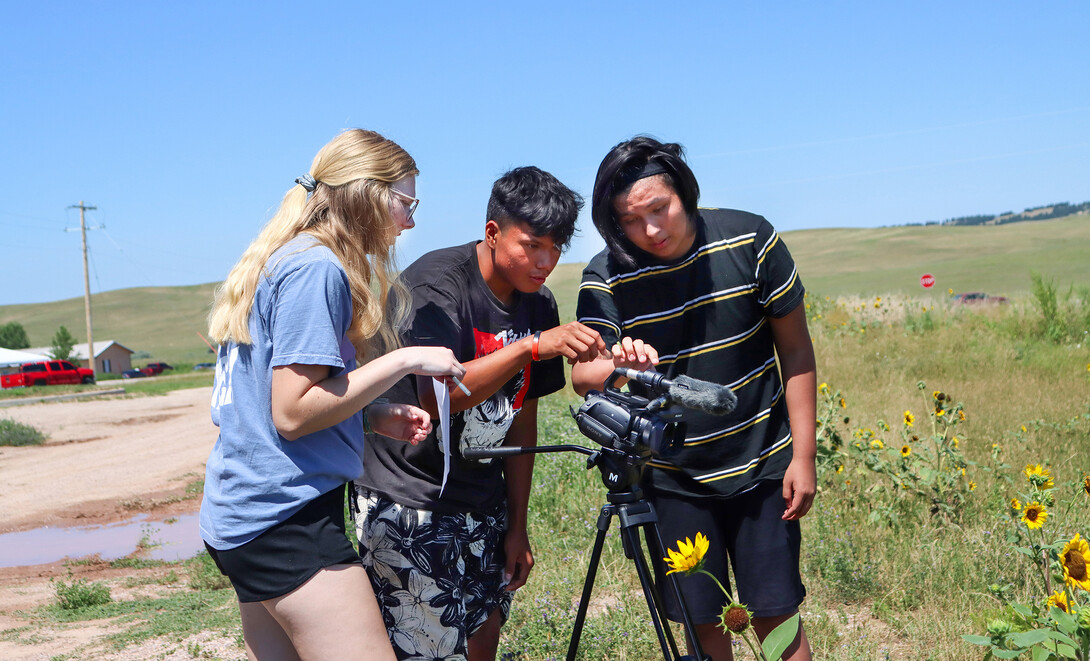
During a 10-day stay on the Pine Ridge Reservation in late July and early August, four University of Nebraska–Lincoln students led a summer camp to teach reservation youth how to write, film and edit the stories they want to tell.

In turn, the university students, all enrolled in the selective Johnny Carson Center for Emerging Media Arts, learned about the history, culture and landscape of the Pine Ridge Reservation and the Lakota people who live there.
“Even though there are reservations around us in Nebraska, a lot of us don’t know about the inside workings of tribal communities or their cultures,” said Wyatt Debban, a fourth-year student from Kearney, Nebraska. “It’s always fun working with youth, teaching them how to shoot film and tell their stories. But I also thought it would be a good opportunity to just learn, first-hand, and to help tell the stories of people who live there.”
“It was a highlight of my summer,” said Kylie Muller, a native of Papillion, Nebraska, who plans to graduate in December 2024. “It was really inspiring — it made me more excited about my own work, because the youth were so excited.”
Led by award-winning filmmaker Sharon Teo-Gooding, formerly a professor in the Johnny Carson School of Theater and Film, the film camp was a component of the Wahwala Iyohlogya (Peaceful Means) sexual violence program being launched this year on the Pine Ridge Reservation.
With support from a $3.2 million Grand Challenges catalyst grant awarded in August 2022, and led by UNL’s Interpersonal Violence Laboratory and educational psychologist Katie Edwards, Wahwala Iyohlogya launched a six-week program of self-defense and personal empowerment classes in elementary schools across the 3,500-square-mile reservation this fall.
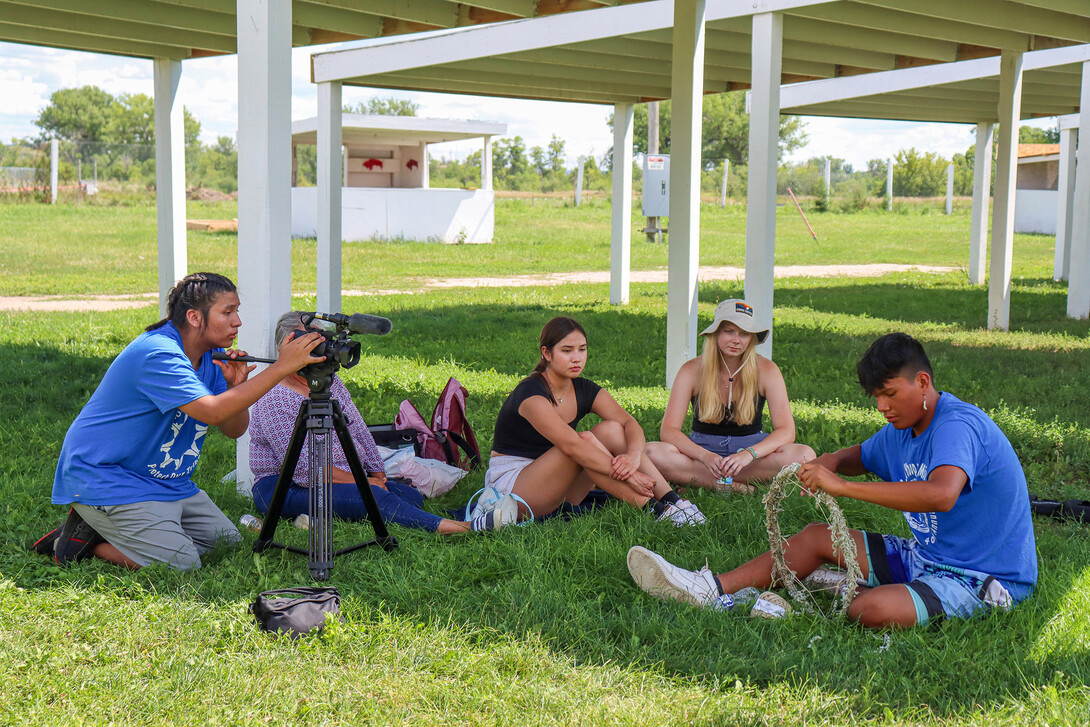
Taught by trained instructors from the Lakota community, the weekly classes are to be expanded to middle and high schools in January.
The Peaceful Means program integrates evidence-based prevention skills with traditional Lakota cultural values to reduce sexual assault and relationship violence among Indigenous youth.
“The film component is a very important part of our Grand Challenges work,” Edwards said. “It will not only document the journey and impact of the work of Peaceful Means, but will most importantly give voice to the Lakota oyate (people) and empower Lakota youth and UNL students to support sharing these stories with what I imagine could be an international audience.”
“Sexual violence here, like in other tribal communities, is a crisis,” said Mona Herrington of Rapid City, South Dakota, who serves as cultural outreach director for the Interpersonal Violence Laboratory. “This program and the Peaceful Means Center is the answer for our youth. It gives them education and identity and a voice to help them in this journey. It will help save the lives of our youth.”
Teo-Gooding, now associate director and professor at The Sidney Poitier New American Film School at Arizona State University, is a co-investigator with Wahwala Iyohlogya. Along with the film camp for reservation youth, Teo-Gooding and the Husker students will make a documentary film about sexual violence on Native American reservations and the efforts underway to prevent it. Teo-Gooding said she was proud of how the young filmmakers adopted key lessons about making documentaries.
“A documentary is very different from a narrative film,” she said. “With a narrative film, you develop a script before you shoot. With a documentary, especially in a Native community where there are a lot more nuances than you might be aware of, we develop the story based on our interviews.”
Teo-Gooding’s team interviewed about a dozen tribal leaders, spiritual leaders and Wahwala Iyohlogya instructors during their visit to Pine Ridge. They also visited a school, the Wounded Knee Memorial Site and South Dakota’s Badlands region. Their stay culminated with the Pine Ridge Pow Wow in early August.
The Husker team also included Hannah Pedersen, a fourth-year student from Phillips, Nebraska, and Hank Ball, a third-year student from Lincoln. Other Husker students will participate in the project as it continues during the next two years. The students worked with seven Lakota youth, from the sixth to the 10th grade, during the four-day camp. The youth divided into two groups, one that wanted to make a horror movie and another that wanted to do a documentary about preserving the Lakota language, featuring a family member who is one of few remaining teachers of the language.
Cousins Amos Little, 12, and Alexander Brave Heart, 15, said the camp deepened their interest in art and filmmaking. The two boys teamed up on their horror movie, with Brave Heart serving as director and screenwriter and Little as camera operator. Called “Shannon County,” the movie is about a shape-shifting life form that is terrorizing residents.
“It was an opportunity to do something new,” said Brave Heart, whose mother, Amber Sierra, encouraged him to participate. “I make digital art and graphic design, and my mom thought my ideas could become more than something on the screen.”
Little began learning about filmmaking in summer 2022, when he was cast in a speaking role for Kevin Costner’s upcoming “Horizon: An American Saga,” a multi-part epic Western. He and other youth cast in the movie received in-person coaching from Costner as shooting got underway in Utah.
“He just realized it was something he wanted to do,” said his mother, Blue Dawn Little, who signed him up for the film camp to nurture his budding interest. She said her son had been struggling with grief after his uncle, who was his father figure, died unexpectedly in 2022.
“When he got the role, for us it felt like the answer to a prayer,” Blue Dawn Little said. “He found his confidence, he did find a purpose. I hadn’t seen Amos so happy since before we lost my brother.”
Little and Brave Heart said they relished using the equipment provided by the project and their college-student instructors were fun.
“It was a little challenging at first, but they were good teachers and easy to talk to,” Little said. “They were funny.”
The Lakota youths were taught to use Sony 4K camcorders with shotgun microphones, boom poles and light kits, as well as state-of-the-art computer editing software. All the equipment is stored at the Peaceful Means offices near tribal headquarters in Pine Ridge, so that the reservation youth can check it out to continue work on their projects. Teo-Gooding’s team will assist the youth via remote computer sessions and return trips to Pine Ridge.
Ball said he was about the same age as the Pine Ridge students when he started playing with filmmaking.
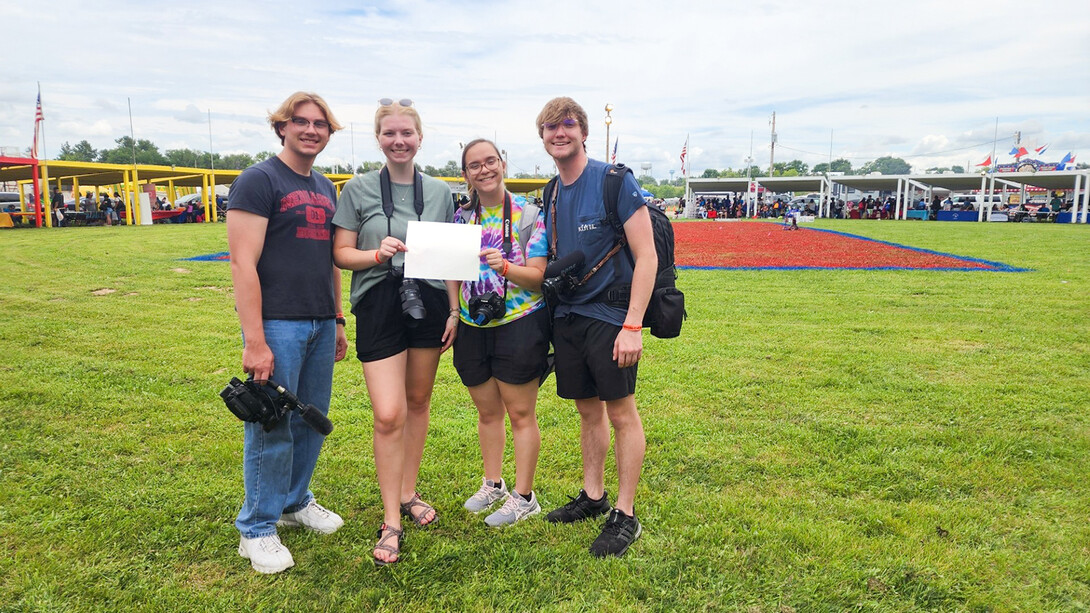
Since time was limited, both groups focused on creating trailers to highlight their longer-term projects.
“It seemed like all of our students had a specific reason for being in film camp,” Pedersen said. “A few want to be actors, so we talked about continuity in acting. A few others were more interested in camera work or directing and writing. They all had an interest in the filmmaking process and wanted to explore different ideas.”
Ball said his Pine Ridge experience helped broaden his perspective of the world. Ball was born in Grand Island, Nebraska, and attended school at Elmwood-Murdock and Waverly before graduating from Lincoln Christian High School. He said he grew up very “Nebraska-focused” and had never flown on an airplane before he went on a September 2022 study abroad trip to London with the Emerging Media Arts program.
“Seeing the outside world has opened my mind to look at other cultures,” he said. “This opportunity to go to Pine Ridge has really been helpful for my learning and expanding my worldview.”
